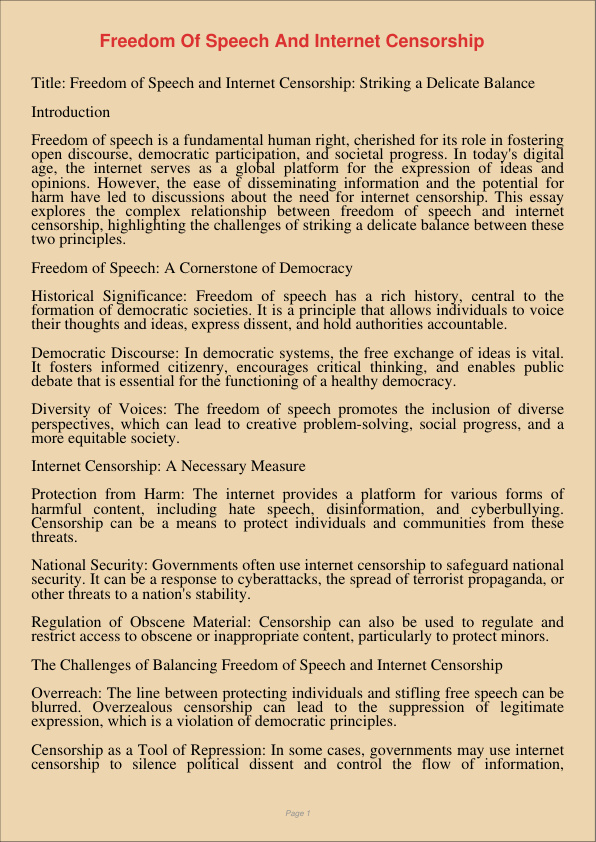Freedom Of Speech And Internet Censorship
Jan 12, 2024
internet censorship
speech
Marketing
Other

Title: Freedom of Speech and Internet Censorship: Striking a Delicate Balance
Introduction
Freedom of speech is a fundamental human right, cherished for its role in fostering open discourse, democratic participation, and societal progress. In today’s digital age, the internet serves as a global platform for the expression of ideas and opinions. However, the ease of disseminating information and the potential for harm have led to discussions about the need for internet censorship. This essay explores the complex relationship between freedom of speech and internet censorship, highlighting the challenges of striking a delicate balance between these two principles.
Freedom of Speech: A Cornerstone of Democracy
Historical Significance: Freedom of speech has a rich history, central to the formation of democratic societies. It is a principle that allows individuals to voice their thoughts and ideas, express dissent, and hold authorities accountable.
Democratic Discourse: In democratic systems, the free exchange of ideas is vital. It fosters informed citizenry, encourages critical thinking, and enables public debate that is essential for the functioning of a healthy democracy.
Diversity of Voices: The freedom of speech promotes the inclusion of diverse perspectives, which can lead to creative problem-solving, social progress, and a more equitable society.
Internet Censorship: A Necessary Measure
Protection from Harm: The internet provides a platform for various forms of harmful content, including hate speech, disinformation, and cyberbullying. Censorship can be a means to protect individuals and communities from these threats.
National Security: Governments often use internet censorship to safeguard national security. It can be a response to cyberattacks, the spread of terrorist propaganda, or other threats to a nation’s stability.
Regulation of Obscene Material: Censorship can also be used to regulate and restrict access to obscene or inappropriate content, particularly to protect minors.
The Challenges of Balancing Freedom of Speech and Internet Censorship
Overreach: The line between protecting individuals and stifling free speech can be blurred. Overzealous censorship can lead to the suppression of legitimate expression, which is a violation of democratic principles.
Censorship as a Tool of Repression: In some cases, governments may use internet censorship to silence political dissent and control the flow of information, undermining democratic values.
Ineffectiveness: Censorship often proves ineffective in preventing harmful content, as it can be easily circumvented through technological means, such as VPNs.
Content Moderation Challenges: Platforms face the challenge of moderating vast amounts of content, making it difficult to consistently apply censorship policies.
Striking a Balance
Transparent Policies: Clear and transparent policies that outline the circumstances under which censorship may be applied can help ensure that it is not abused.
Independent Oversight: Oversight by independent bodies can help prevent government overreach in the name of censorship.
User Empowerment: Empowering users to make informed choices about the content they consume and interact with can mitigate the need for heavy-handed censorship.
Global Cooperation: Given the global nature of the internet, international cooperation is necessary to address issues that transcend national borders, such as cyberbullying and disinformation.
Conclusion
The tension between freedom of speech and internet censorship reflects the complexities of our digital age. It is imperative to safeguard freedom of speech while addressing the real challenges posed by harmful content. Striking a delicate balance between these two principles is a multifaceted task that requires the involvement of governments, tech companies, civil society, and individual users. Ultimately, preserving freedom of speech in the digital era while curtailing harm necessitates thoughtful and inclusive discussions on regulation and its implications for our societies.